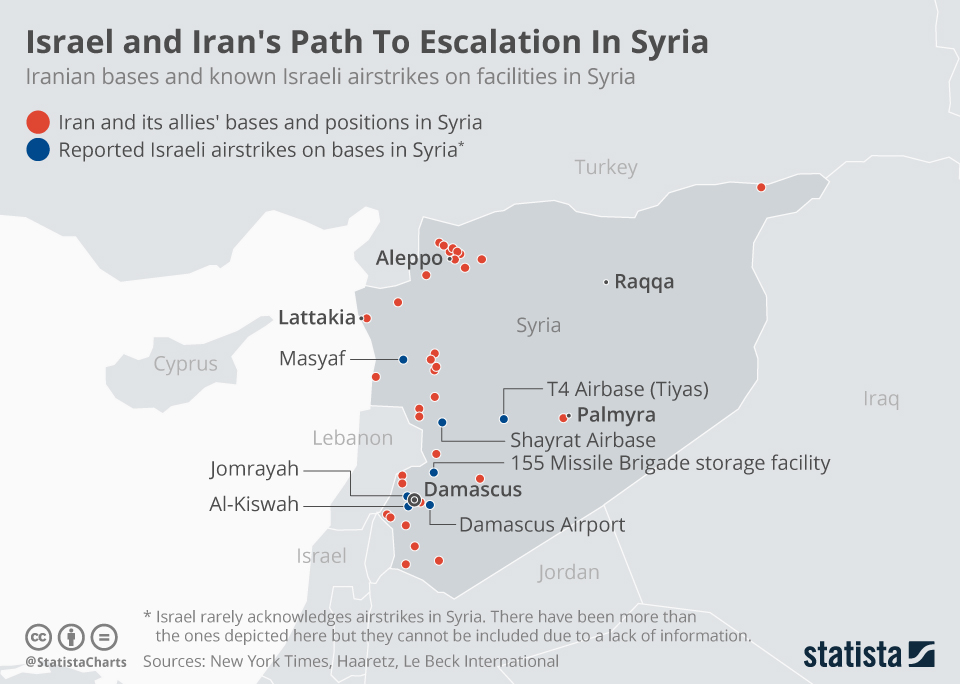Tensions between Israel and Iran rise over Syria
January 24, 2019 | Expert Insights
Israel has launched its most incisive attack on Iranian positions in neighbouring Syria since the civil war began in 2011 , bring the two nations closer to the verge of a direct collision. Israel has pledged to stop Iran and its Lebanese ally, Hezbollah from entrenching itself militarily in Syria.
Background
Syria has been the centre of great power politics, and several attempts were made by various forces to control the region through military intervention. It also became a battlefield between different ideologies, and quests for autonomy amidst the rise of Islamic State. Powers such as the US, Russia, Iran, Saudi Arabia, Qatar and Turkey all sought a role in Syria.
With the rise of ISIS in 2014, the skirmishes in Syria metamorphed into a civil war. This included a conflict between ISIS and other countries, amongst various rebel groups, a demand for rising Kurdish autonomy in the east and greater involvement by Iran. Israel was cautious until 2016 when reports appeared in foreign media indicating an increase of Iranian arms transfers via Syria.
Israel revealed in the fall of 2017 that it had carried out 100 air strikes against weapons transfers in Syria, and later said in 2018 that this number had increased to 200. Israel also warned Iran against remaining in Syria after the Syrian civil war ended. Iran replied that it had been invited to Syria by the government.

Analysis
Twelve soldiers belonging to Iran’s Revolutionary Guard Corps were killed in IDF air strikes on Syria, claimed a UK-based NGO Syrian Observatory for Human Rights. The report said a total of 21 people were killed in the strikes – among them six Syrian soldiers and 15 non-Syrian nationals, 12 of whom were IRGC soldiers – making it the deadliest attack by Israel so far in the war-torn country
The latest round of attacks between Israel and Iran began with a series of Israeli air strikes on Iranian targets in Syria. The missile strikes took place during the day and Israel’s military made a rare admission of responsibility as it was carrying out the strikes on Twitter that “We have started striking Iranian Quds targets in Syrian territory. We warn the Syrian Armed Forces against attempting to harm Israeli forces or territory.”
Israel’s military said the widespread air strikes came as a response to a surface-to-surface missile that was launched toward the Golan Heights by Iranian forces in the vicinity of Damascus. The missile, reported to be carrying a half-ton warhead and aimed at deterring Israel from conducting further air strikes in Syria, was intercepted by the Iron Dome missile defense system.
“The Iranian attack on Israeli territory yesterday is yet another clear proof of the intention behind the attempts to establish Iran in Syria and the danger they pose to the State of Israel and regional stability,” the IDF Spokesperson’s Unit said in a statement. “The IDF will continue to act decisively and firmly against the Iranian establishment in Syria.”
"Israel will continue to block Iran's efforts to use Syria Lebanon and Gaza as forward bases for attacking Israel for the express purpose which they openly declare — destroying Israel," Prime Minister Netanyahu said. Former National Security Council head Maj.-Gen. (Res.) Yaakov Amidror “Israel is trying to block the building of an independent Iranian force in Syria and is trying to block the transfer of precision weapons to Hezbollah via Syria,"
The sharp increase in tensions between Israel, Syria and Iran, comes at a time when the security situation in Syria is rapidly changing owing to the recently announced US troop withdrawal. In the past Russia and the United States have acted to calm tensions between Israel and Iran.
Syrian President Assad has sent two letters to the UN Secretary-General António Guterres and the head of the UN Security Council, calling on them to take immediate steps to prevent further Israeli airstrikes and to hold it accountable for “its crimes against the Syrian and Palestinian people.” “This aggression attempts to raise the morale of the remaining terrorist hotbeds that are subservient to the Israeli occupation, in addition to being an attempt by the occupation authorities to avoid their escalating internal problems,” the report said, adding that “Syria affirms that Israel’s persistence in its dangerous aggressive behavior wouldn’t be possible without the unlimited support of the US administration and the immunity provided to it by the US and other Security Council member states.”
Tehran’s air force chief, Brig Gen Aziz Nasirzadeh, said Iran was “fully ready and impatient to confront the Zionist regime and eliminate it from the Earth”.
Assessment
Our assessment is that Israel has embarked on a policy of aggression in Syria that threatens rather than protects the security of Israel. It is likely that this aggression will be seen as a clear violation of international law, given that Syria is cooperating with Iran. It can be noted that Russia’s main interest it to achieve stability in Syria and to preserve President Bashar Assad’s regime. Israel had Russian support until it downed the Russian jet. We feel that Israel is likely to make arrangements with Russia to deescalate the conflict.








Comments